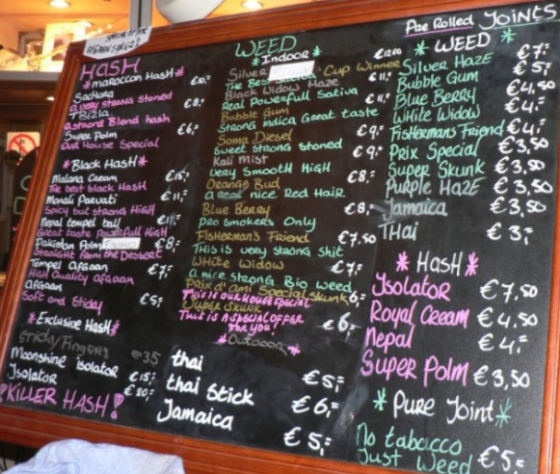Ryan Kyle
Mention Amsterdam to almost anyone and the conversation will ultimately turn to the city’s relaxed, liberal attitude to drugs and prostitution. However, the right-wing winds of change have started to sweep the Netherlands as the country’s famous coffee shops are forced to slam their doors shut to tourists.
The ban on drug sales came into force in South Holland on May 1st and is due to affect the tourism hotspot of Amsterdam and North Holland in January 2013. The move has been met with fierce opposition though, with coffee shop owners, tourists and pressure groups describing the legislation as ‘political suicide’, ‘discrimination’ and ‘an economic disaster’.
Over the past few years, the Dutch government has slashed away at the country’s traditional, liberal view on soft drugs. There are now 650 coffee shops in the Netherlands, a figure that has declined steadily because of new laws, such as the one that permits coffee shops operating within 250 metres of a school. The current legislation is likely to reduce that even further, with retailers arguing that they will lose a large proportion of their customers and, in the long run, their business.
The main purpose of the new legislation, which has been upheld by a Dutch court, is to put a stop to drug tourism and stop criminality. There can be no denying that drug tourism has been a monumental burden to towns along the Dutch border, with people from Belgium and northern France entering the Netherlands, buying large quantities of cannabis and then selling it in their respective nations. However, the idea of criminality caused by drugs has been met with scepticism and disapproval.
With Amsterdam set to be hit hard by the ban on cannabis, and with many predicting a huge decline in tourism, I spoke to Maxine Scott, a student from Glasgow who visited the Netherlands just last month, to see if her views on the country would be affected by the ban.
She said: “I would still go to Amsterdam because I’ve been recently and I love the city, but I don’t think that young people and students would choose to go there as a holiday or weekend away with their friends when the new laws come into play. For example, most teenagers will go to places like Ibiza for a party, and Amsterdam is somewhat the same. People like to go and explore the Dutch culture and try out the coffee shops. You know, when in Rome…
“The Dutch government says it’ll decrease criminality but I think it’ll do the opposite. It’ll bring people out onto the streets to sell drugs to the tourists who’ll happily buy them because they can’t get into a coffee shop. That causes danger for the tourists because all it takes is one dealer to steal your money or give you drugs that are dodgy or have been tampered with. At least in a coffee shop, tourists know what they’re getting and it’s all legit. It could be dangerous for the dealer too as a group of tourists could easily mug them. The government has to consider this.
“The culture is the best thing about the Netherlands because it’s so different, laid-back and relaxed. Everything in the UK is about health and safety and political correctness, which is good in a way, but that’s what makes it good to go out and get a taste of the Dutch culture as it’s the complete opposite. Most people wouldn’t believe it until they’ve experienced it, but my worry is that the Dutch government is going to change this and that Amsterdam won’t be as popular to tourists anymore.”
It is clear that there is going to be a drastic change in tourism in Amsterdam. That much is obvious. However, the government will have to make their decision and weigh up the positives and negatives: relations will be better with bordering countries as drug trafficking will be reduced, but finances will be severely impaired by such a major turnaround in, not only national policy, but the national frame of mind. By the time the Dutch elections come around in September, the people of the Netherlands will vote with this in mind.
There will be a large number of tourists watching that election, and praying that the legislation is ignored or, better yet, reversed.


Leave a comment